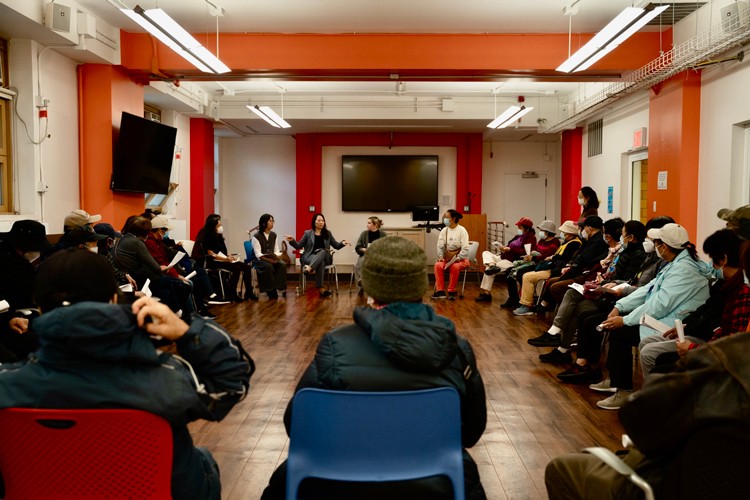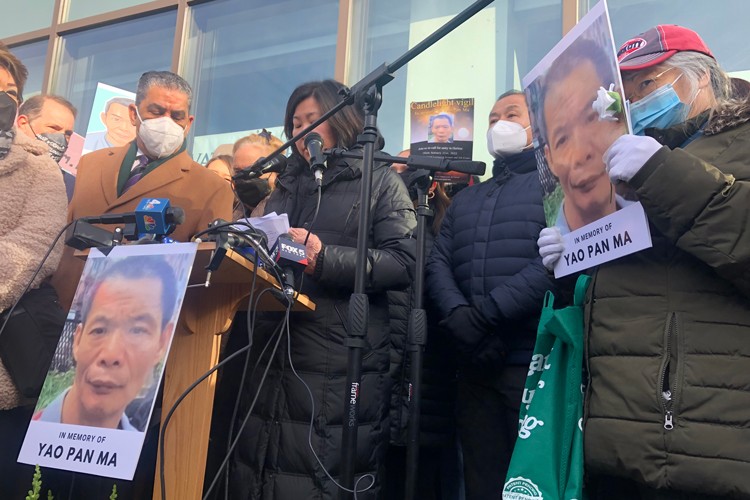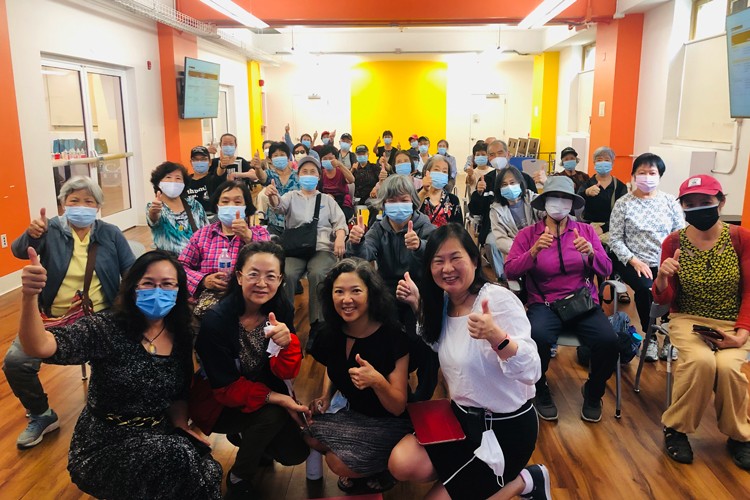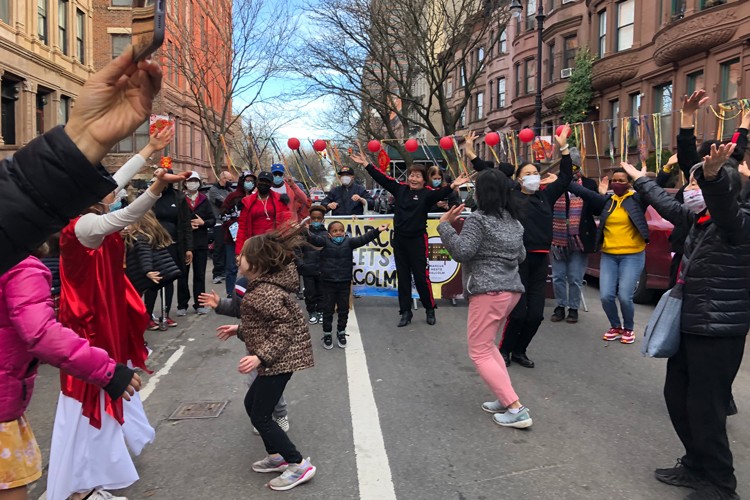How Eva Chan and Lilian Chow Are Empowering the Senior Asian Community in Harlem
Upper Manhattan Asian American Alliance founders, Eva Chan and Lilian Chow, spoke with Neighbors about their grassroots advocacy.

Jump-starting a grassroots advocacy group is not an easy feat. For Lilian Chow and Eva Chan—cofounders of the Upper Manhattan Asian American Alliance (UMAAA)—the past few years of organizing around the needs of the senior Asian population in East Harlem have been especially challenging.
In spite of these challenges and with the help of volunteers, partnerships, community members, and the duo’s willpower, UMAAA has tackled issues ranging from public safety to food insecurity to small business support. As the cofounders assess the present state of the pandemic and anti-Asian hate crimes in New York City, they remain cautiously optimistic for the future.
The 2020 Census found that 7% of the Upper Manhattan population is comprised of people who identify as Asian or Pacific Islander. Although there is a sizable population of Asian Americans who live in Uptown, more seniors are specifically moving into the area because of the preponderance of affordable senior housing, according to Bloomberg.
As we enter National Asian/Pacific American Heritage Month, Columbia Neighbors caught up with Chan and Chow to discuss the current issues facing the senior Asian population Uptown and the community collaborations that they look forward to seeing in the future.
We talked last year when UMAAA had been operating for just under a year. What services do you continue to provide?
Eva Chan (EC): In the summer of 2021, we started distributing meals to Asian seniors with the help of Heart of Dinner. We’re looking for ways to expand that service because there’s a lot of interest. There is a real lack of groceries for these Asian seniors. They are forced to travel long distances to Chinatown to do their grocery shopping because they don’t know how to use the vegetables and produce that are in the markets near them.
We’ve been in conversation with grocery store owners in the area–some of which are actually Korean–and they cannot justify selling Asian groceries because there’s not enough demand to cover the cost. So it’s not an easy thing to solve. That’s why we continue our work with Heart of Dinner which gives out Asian vegetables—and the seniors love it.
Lilian Chow (LC): We’ve also been looking at pantries to bring in produce that is more to their taste. Asian Americans for Equality (AAFE) is another organization that we work with and that is starting up a Community Supported Agriculture (CSA) market in collaboration with young Asian American farmers upstate. They’re growing more produce like bokchoy and other Asian vegetables. They’re going to bring shares down to the city twice a month soon—around May and throughout the summer—and buyers will be able to use food stamps. It's so exciting to have something intergenerational that meets their needs even though it’s not the perfect solution of an Asian grocery store.
Tell us about the most pressing issue your organization has been facing this year.
EC: Public safety has been a huge issue. Many of these seniors who are new to the area are isolated and don’t speak English. Yao Pen Ma [a 61-year-old Asian immigrant who was assaulted in East Harlem] was wandering around at night collecting cans in an unsafe area that locals know not to walk in during certain hours of the day.

The language barrier is the primary issue because it's difficult to overcome and it worsens the problems of discrimination that they face. There are social services that are available in the city, but it’s difficult for seniors to access them without knowing how to advocate for themselves through a language barrier.
LC: At NYCHA houses, we’re working on getting Asian seniors connected to the staff and the resources that already exist and that they need to connect with in order to address their concerns about public safety. Eva has been attending meetings and–along with a volunteer–has been helping to translate.
There’s been some work done by local offices around defining what exactly is a hate crime and there’s been some hiring to expand the Hate Crimes Unit. The District Attorney's office has also been meeting with Asian American organizations to talk through their concerns and questions. However, one of the things we’re struggling with the most is a lack of information about hate crimes in general. We can only operate on broad strokes – like how there’s a need to address mental illness, ignorance, or discrimination. Unfortunately, reducing hate crimes is a long-term issue and nobody has clear answers.
I know grassroots advocacy takes a lot of time and energy. If you had more volunteers, what kind of work would you expand on?
LC: First of all, we definitely need a few more people to help out. Even people who are willing to translate for seniors are a real need. However, it’d be really great to get to start an interview or research project of some sort– maybe even an official survey. We only know if something is an issue if it comes to us from the seniors on WeChat.

EC: It’s very much a side project for us. We would really love to do more, but there’s just not enough time in the day and sometimes you wonder, what is the best way forward? It’s hard because I think the senior population needs a lot more help than I and Lilian personally have the time for. Our work now is quite ad hoc, so we only have the capacity to prioritize protecting our seniors who are dealing with safety issues–and then we try to tackle whatever else comes our way. It’s hard to be more strategic, but there’s certainly demand for this kind of work. [See how to volunteer below]
You’ve had some community gatherings in the past. Any ideas for the future?
LC: We’ve toyed with the idea of having a cross-cultural event of some sort between Asian and Black populations Uptown. We’ve been getting ideas from what people have done in other cities like San Francisco, such as an Asian-Black cookout, which we thought could be really fun. People could barbecue and share each other’s favorite barbecue dishes, and we could have raffles—just enjoy each other's company. So that could be something to look forward to in the future.

Last year we did a celebration with the Harlem Block Association on their open street on 120th Street between Malcolm X Boulevard and Marcus Garvey Park. We were celebrating Mayor Adams’ mandate that Asian American and Pacific Islander history be taught in the New York City public schools—which was a real milestone. It’d be great to do more events like these. We hope that anti-Asian hate crimes will decrease now that the worst of the pandemic is over, but we haven’t seen the numbers on that yet. So, we’re trying to think of what could be fun–maybe even musical performances! Anything that people will turn out for and enjoy would be amazing.
As we move forward into AAPI Heritage Month, are there any spots you recommend Uptowners get to know to honor the month?
LC: Our family's favorite Asian restaurants are Bangklyn–which is a Thai restaurant, Thai Super, Indian Summer, and A1 Asian Fusion. Oh! There are also two Hand-Pulled Noodles uptown—one closer to the 150s and one in the 120s—both of which are so good.
EC: I love Aloaf Bakery Cafe because their pastry is so authentic. They have real authentic Cantonese pastries. It’s really hard to get authentic Chinese pastries so when I see them here, it’s a really good feeling. I feel like there’s hope.